The way we talk or we narrate any story is called narration. There are mainly two ways how a speaker reports words to narrate anything. Let’s discuss the Narration rules in a simple way that will make it easier for us to comprehend the guidelines for changing from one type to another.
What are the types of narration?
The two ways to report the words of a speaker are known as Direct Speech and Indirect Speech. But what exactly are they? And how do we use it in narration?
-
What is Direct Speech?
A direct speech is a sentence in which the exact words said are repeated in inverted commas (also known as quotation marks). To write and indicate a direct speech, we use quotations (“ “). That’s why it is sometimes called quoted speech. An important thing to remember is that the words inside the quotation marks should be the exact words of the speaker or the person in concern.
For example:
- “Do you understand the narration rules?” asked Nishat.
- Mahi said, “Bring me a fruit basket when you come back home.”
- “What’s that?” asked Junayed.
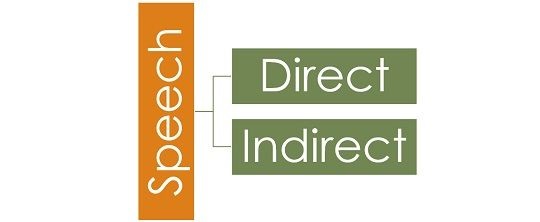
-
What is Indirect Speech?
When the message of what someone said is communicated without actually writing the statement out in whole, it is known as indirect speech. It is also known as reported speech. Indirect Speech refers to conveying the message of the speaker only. It doesn’t have to be the exact words. Here, the main focus is on the message. Indirect Speech is not written with quotations (“ “) and we convey the message of the speaker in our own words without changing its meaning.
Besides, when we change the speech, the tense of the sentence usually changes. The speaker (who actually said it) said the words in the past and we convey our message, keeping the timeline in our minds. Thus, the verbs used in Indirect Speech are mostly in past forms.
For example:
- Rahim said to Karim that he was going to the cinema. (Direct Speech: Rahim said to Karim, “I’m going to the cinema.”)
- My father said that he was going to buy a new car. (Direct Speech: My father said “I’m going to buy a new car.”)
- Junayed asked what that was. (Direct Speech: “What’s that?” asked Junayed)
We will learn more about these conversions from Direct to Indirect speech in the latter part of the conversation.
ঘরে বসে Spoken English
কোর্সটি করে যা শিখবেন:
Basic Narration Rules
Narration Rules For Direct Speech
Following are the basic rules that are needed to be followed while using Direct Speech while communicating:
- Every single character’s speech begins with a new sentence.
- Speech marks or quotation marks are used to start a speech.
- Each line of a speech begins with a capital letter.
- The sentence is punctuated with a comma, exclamation mark, or question mark at the end.
- A reporting clause is used at the end (said John, shouted Sadia, replied Karim).
- After the reporting clause, there should be a full stop.
- If the direct speech in the phrase is separated by information about who is speaking, use a comma to end the first part of speech and a full stop or another comma before the second part (before the inverted commas), for example: “It’s nice,” she murmured, “but I can’t even afford it right now.” Or “I agree!” exclaimed Kate. “All right, let’s go!”
Narration Rules For Indirect Speech
There are not many rules to write an indirect speech however some things need to be noted while writing an Indirect Speech. These are:
- There will be no quotation marks, speech marks, or inverted commas.
- Sentences should be changed when converting direct speech to indirect speech.
How To Convert Direct Speech to Indirect Speech:
A sentence must be changed when converting direct speaking to indirect speech. Such as:
- The tenses of verbs are commonly switched back (mostly to the past)
- The order of the words often requires change
- Pronouns should usually be adjusted
- Words expressing location and time must be changed
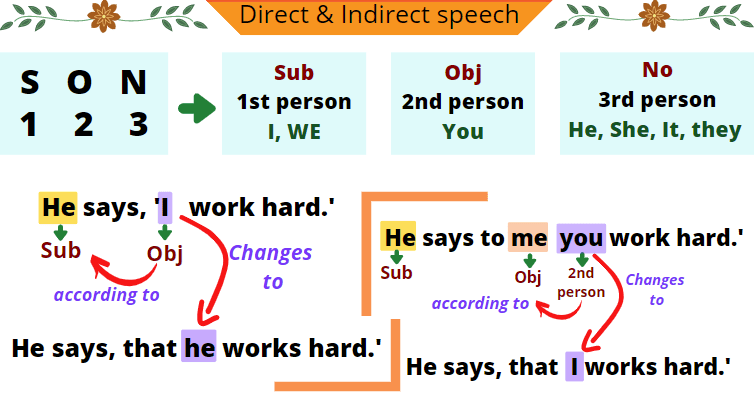
Changes in Person of Pronouns:
- First-person pronouns in indirect speech are changed according to the subject of the direct speech.
- Second-person pronouns in indirect speech are always changed according to the object of the direct speech.
- Third-person pronouns in indirect speech are not changed.
Changes in Verbs:
If the direct speech is in the present or future tense, the verb in the indirect speech does not need to be changed. This verb can be in any tense, such as the present, past, or future. However, the changes regarding the pronouns will still be applied. For example:
- Direct Speech: She says, “I am sick.”
- Indirect Speech: She says that she is sick.
- Direct Speech: He says, “Jack sang a song.”
- Indirect Speech: He says that Jack sang a song.
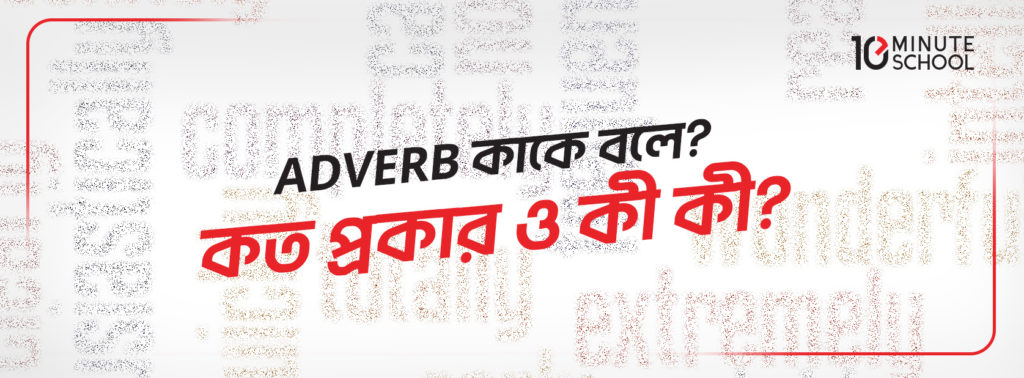 Read more: Adverb কাকে বলে? কত প্রকার ও কী কী?
Read more: Adverb কাকে বলে? কত প্রকার ও কী কী?
If the reporting verb is in the past tense, it will be converted according to the following conditions.
Present Indefinite is converted to Past Indefinite tense. For example:
- Direct Speech: He said, “Paul takes a walk every day.”
- Indirect Speech: He said that Paul took a walk every day.
IELTS Course by Munzereen Shahid
কোর্সটি করে যা শিখবেন:
Present Continuous to Past Continuous tense. For example:
- Direct Speech: He said, “Paul is taking a walk every day.”
- Indirect Speech: He said that Paul was taking a walk every day.
Present Perfect to Past Perfect tense. For example:
- Direct Speech: He said, “Paul has taken a walk every day.”
- Indirect Speech: He said that Paul had taken a walk every day.
Present Perfect Continuous to Past Perfect Continuous tense. For example:
- Direct Speech: He said, “Paul has been taking a walk since 6 AM.”
- Indirect Speech: He said that Paul had been taking a walk since 6 AM.
Past Indefinite or Simple Past to Past Perfect tense. For example:
- Direct Speech: He said, “Paul took a walk.”
- Indirect Speech: He said that Paul had taken a walk.
Past Continuous to Past Perfect Continuous tense. For example:
- Direct Speech: He said, “Paul was taking a walk.”
- Indirect Speech: He said that Paul had been taking a walk.
There’s no change in Past Perfect and Past Perfect Continuous tense. Example:
- Direct Speech: He said, “Paul had taken a walk.”
- Indirect Speech: He said that Paul had taken a walk.
No further changes are required for future tense except that shall/will should be changed to would. Example:
- Direct Speech: He said, “Paul will take a walk.”
- Indirect Speech: He said that Paul would take a walk.
কোর্সটিতে যা যা পাচ্ছেন:
ঘরে বসে English Grammar
Some Other Examples of Direct Speech Converted to Indirect Speech:
- Direct Speech: Shabab says, “I eat an egg a day.”
- Indirect Speech: Shabab says that he eats an egg a day.
- Direct Speech: Matin said, “I bought the book yesterday.”
- Indirect Speech: Matin said that he had bought the book the previous day. (Here, “yesterday” is converted into “the previous day”. It can also be written as “the day before”.)
- Direct Speech: Samantha said, “I shall leave for London tomorrow.”
- Indirect Speech: Samantha said that she would leave for London the next day. (You can also use “the following day” for replacing “tomorrow” in indirect speech.)
- Direct Speech: They said, “We have watched the movie already.”
- Indirect Speech: They said that they had watched the movie already.
If you have read this far, we hope you understood the basics of narration rules and its rules with the examples used. If you want a more in-depth understanding, enroll in our ‘ঘরে বসে English Grammar’ course now!
আরো পড়ুন:
- হয়ে যাক ইংরেজিতে কথা বলার হাতেখড়ি!
- স্পোকেন ইংলিশে আমাদের করা ১০টি কমন ভুল
- স্পোকেন ইংলিশে আমাদের কিছু খারাপ অভ্যাস
- ইংরেজিতে পারদর্শী হবার ১০টি পদ্ধতি!
- ইংরেজিতে ইন্টারভিউয়ের টপ প্রিপারেশন
- শিশুর স্পোকেন ইংলিশ দক্ষতা বাড়াবেন যেভাবে
- জেনে নিন ইংরেজি রিডিং পড়ার সহজ উপায় ও English Reading Skill বৃদ্ধি করার উপায়
- How to learn English at home
- ইংরেজি শেখার সহজ উপায়: কীভাবে পারদর্শী হবেন ইংরেজিতে?
- English For Everyday
- Idioms and Phrases
- Academic English Grammar
- English Grammar Fundamentals
- Study Abroad Complete Guideline
- Pronunciation Mistakes
- Grammar Foundation Course
আমাদের কোর্সগুলোতে ভর্তি হতে ক্লিক করুন:
Visit 10 Minute School’s website www.10minuteschool.com

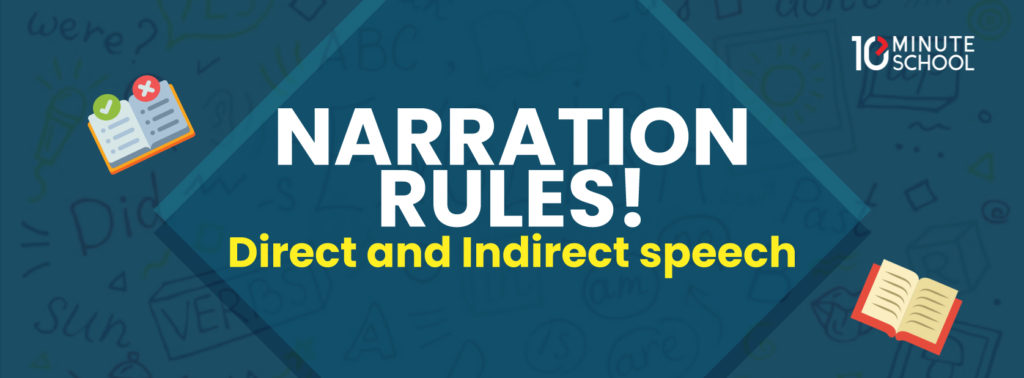
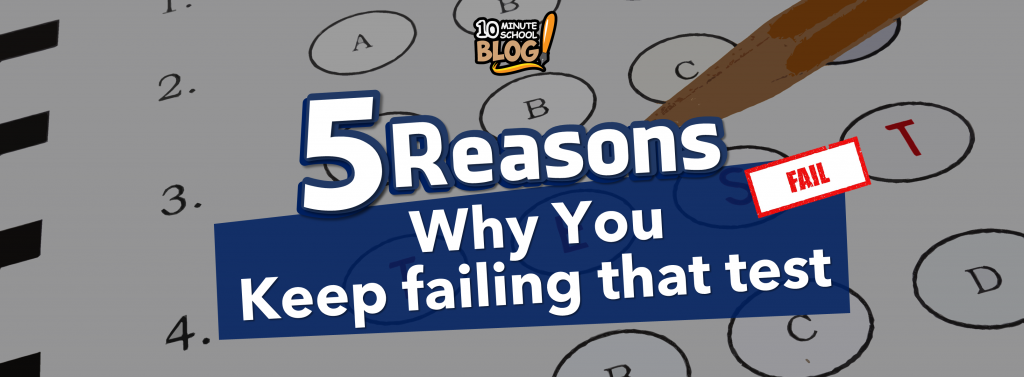


আপনার কমেন্ট লিখুন